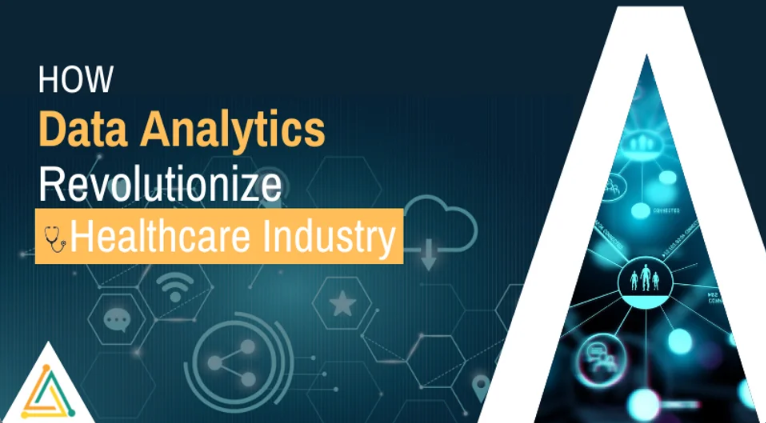Data AnalyticsHow Data Analytics can Revolutionize the Healthcare Industry
24 February 2020

How Data Analytics can Revolutionize the Healthcare Industry
Abstract
Technology has helped fundamentally transform healthcare. But much more can be done. By harnessing the power of data and implementing technological advances into standard processes, the industry can empower patients to self-manage their data and use it for their own healthcare management.
Intro
Analytical solutions are a critical focus in the healthcare industry. Especially during the pandemic, this need has multiplied manifold. Accounts for approximately 30% of the world’s daily data production are now managed by advanced data analytics. Data analytics can help reduce waste, maximize critical resources, track populations of people at risk for specific diseases, and track overall performance within a particular organization down to every patient being treated there. There are specific software tools or apps which offer solutions to bridge the current gap to industries that are benefiting so much that potentially lives are being saved. How big data analytics is revolutionizing the healthcare industry.
When there is so much data to collect, it’s important to identify the actionable data to improve operations – and this doesn’t just apply to the healthcare industry. One of the main problems with data collection and effective data analysis tools is that they collect so much data that no one knows what to do with it. The importance of finding a proper way to use these huge amounts of collected data is decisive. In a developing economy like India which has tighter budgets and lower margins, understanding how these tools can benefit these industries is imperative.
How will Data Analytics fundamentally transform healthcare?
Technological advancement in every industry primarily works its way through data. To utilize the data amassed to significantly transform the industry, healthcare organizations must first build a powerful data system built on an Application Programming Interface economy. This is how data and insights can be shared uninterruptedly on a real-time basis between various healthcare stakeholders. When a strong data system is in working mode, analytics and computing technology must be utilized on the premises of the organizations too, and insights must be consolidated using inoperable APIs.
As with health data, privacy and trust are two of the most important factors. Companies using the latest technologies, create trust between the parties to securely use and deliver data according to the established contracts. Ethical data use based on a patient’s consent is a key factor in the security of patient health data. While the availability of data should be implemented for general use, synthetic data offers numerous benefits to the healthcare industry. Leveraging synthetic data to accelerate the development of AI modules and embed them into common business processes can help drive innovation and digital transformation.
Benefits of Data Analytics solutions in healthcare industry
Analytical solutions offer various ways to understand the medical data in more innovative was and make more data available for analysis with every passing day. Here are some insights on how the analytical solutions help in advancement of the healthcare industry:
Better results with preventative treatments
Healthcare institutions with advanced technological infrastructure often use AI-based solutions to diagnose and treat infectious diseases. Two of the most common form of this is DNA sequencing based technology and AI-based software for fast and accurate identification of microorganisms and antibiotic resistance.
Artificial intelligence offers the possibility to stop infectious diseases before they can spread around the world. Hence in the post pandemic medical world this has proved to be one of the most decisive changes that advanced analytical solution could introduce. AI technology, machine learning and data analysis – quickly identify patients and patterns in medical data about the patients who are at risk of serious health issue by analyzing their medical history. Some of the analytical modeling of the designs reveals new kind of medical treatments in healthcare;has been proved to bring breakthroughs in fighting new spread viruses and preventing infectious diseases all around the world using AI technology.
Data-driven insights for better patient care
Recently the healthcare industry is undergoing gigantic transformation globally. For example, the introduction of the new systems and processes for Electronic Medical Records (EHR), and the usage and dependency on these newly introduced technologies are likely to increase. Some of the trends emerging from efforts to incorporate advanced analytical solutions into healthcare are:
Shifting from acute and episodic treatment models to values-based healthcare Better ways to benefit from large amounts of health data.
Reliable analytics that can help solve complex healthcare challenges.
In the present scenario, simplifying the huge collection of the data accumulated, organizing them and using them with speed and accuracy is the top most challenge of healthcare organizations. However, in order to get the most value out of analytical solutions in healthcare, the choice and preferences of software and apps which can be used that can extract the most valuable data from an enormous amount of information are crucial. Healthcare data analytics enable healthcare organizations to gain important insights from their data. This enables them to identify ways in which they can provide added value, greater effectiveness and better quality of healthcare at an affordable cost, which will ultimately benefit both patients and the organizations.
Conclusion
Shortly, apps, sensors, and data-based monitoring will lead to significantly better preventive care. As a result, curative interventions are less necessary and at the same time, patient care is becoming much more effective thanks to robotics, personalized medicine, AI & Co. These trends are changing the roles of everyone involved in Germany and are leading to new business models in the industry, with additional support from current legislative initiatives.
